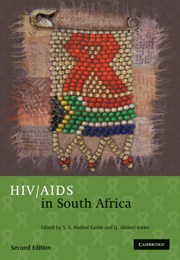Book contents
- Frontmatter
- Contents
- List of Contributors
- Foreword: Peter Piot
- Foreword: Nelson R Mandela
- Acknowledgements
- Section 1 Birth of a rapidly growing epidemic
- Section 2 The virus, the human host and their interactions
- Section 3 HIV risk factors and prevention strategiess
- Section 4 Focal groups for understanding the HIV epidemic
- Section 5 The impact of AIDS
- Section 6 Treating HIV
- Section 7 What does the future hold?
- 33 Models and trends
- 34 The future of the HIV epidemic in South Africa
- Index
33 - Models and trends
Published online by Cambridge University Press: 07 September 2011
- Frontmatter
- Contents
- List of Contributors
- Foreword: Peter Piot
- Foreword: Nelson R Mandela
- Acknowledgements
- Section 1 Birth of a rapidly growing epidemic
- Section 2 The virus, the human host and their interactions
- Section 3 HIV risk factors and prevention strategiess
- Section 4 Focal groups for understanding the HIV epidemic
- Section 5 The impact of AIDS
- Section 6 Treating HIV
- Section 7 What does the future hold?
- 33 Models and trends
- 34 The future of the HIV epidemic in South Africa
- Index
Summary
As far as the propositions of mathematics refer to reality, they are not certain; and as far as they are certain, they do not refer to reality.
Albert EinsteinOUR KNOWLEDGE OF HIV, its mode of transmission, the risk factors for and the consequences of infection, and of ways to reduce transmission, may be greater than for any other known pathogen as earlier chapters in this book testify. And yet, there is no convincing explanation for the dramatic regional variations in the prevalence of HIV infection. We do not know why the eight worst affected countries are all in southern Africa, the next six are in East and Central Africa, and the next fifteen are in West Africa, if we exclude Haiti and Honduras. There is no convincing explanation for the fact that the median prevalence of infection among urban, low-risk groups, is about 30% in southern Africa, 17% in East Africa, 7% in West Africa and less than 1% in Brazil and India. Of even greater concern is the lack of evidence that the many billions of dollars spent on the epidemic have had a significant impact on the transmission of HIV.
The problem is that we know a great deal about the immediate determinants of infection in individuals but little about the factors that determine the long-term dynamics of infection and disease in populations.
- Type
- Chapter
- Information
- HIV/AIDS in South Africa , pp. 569 - 584Publisher: Cambridge University PressPrint publication year: 2010



